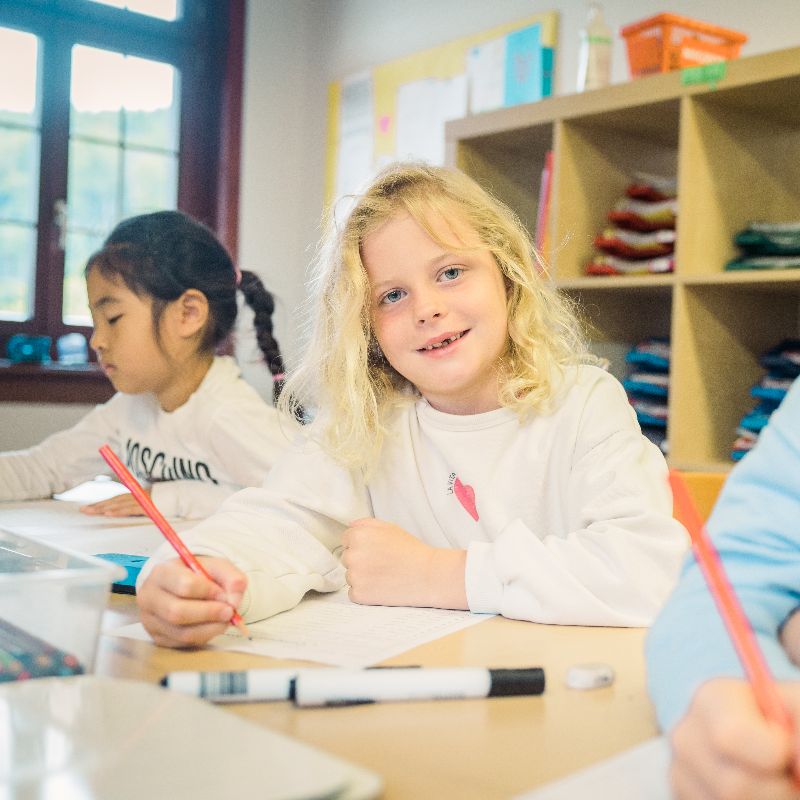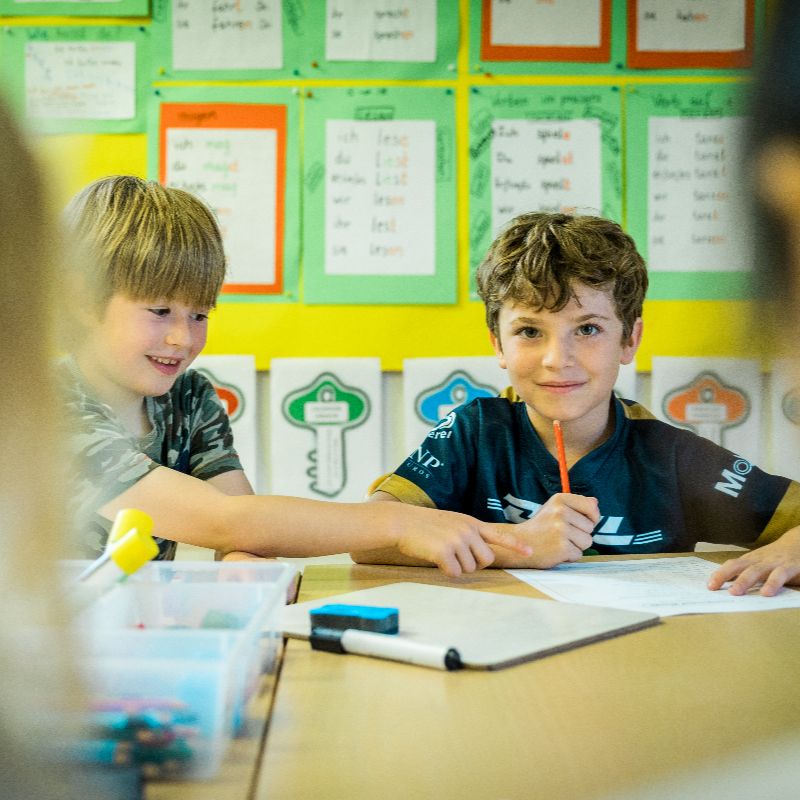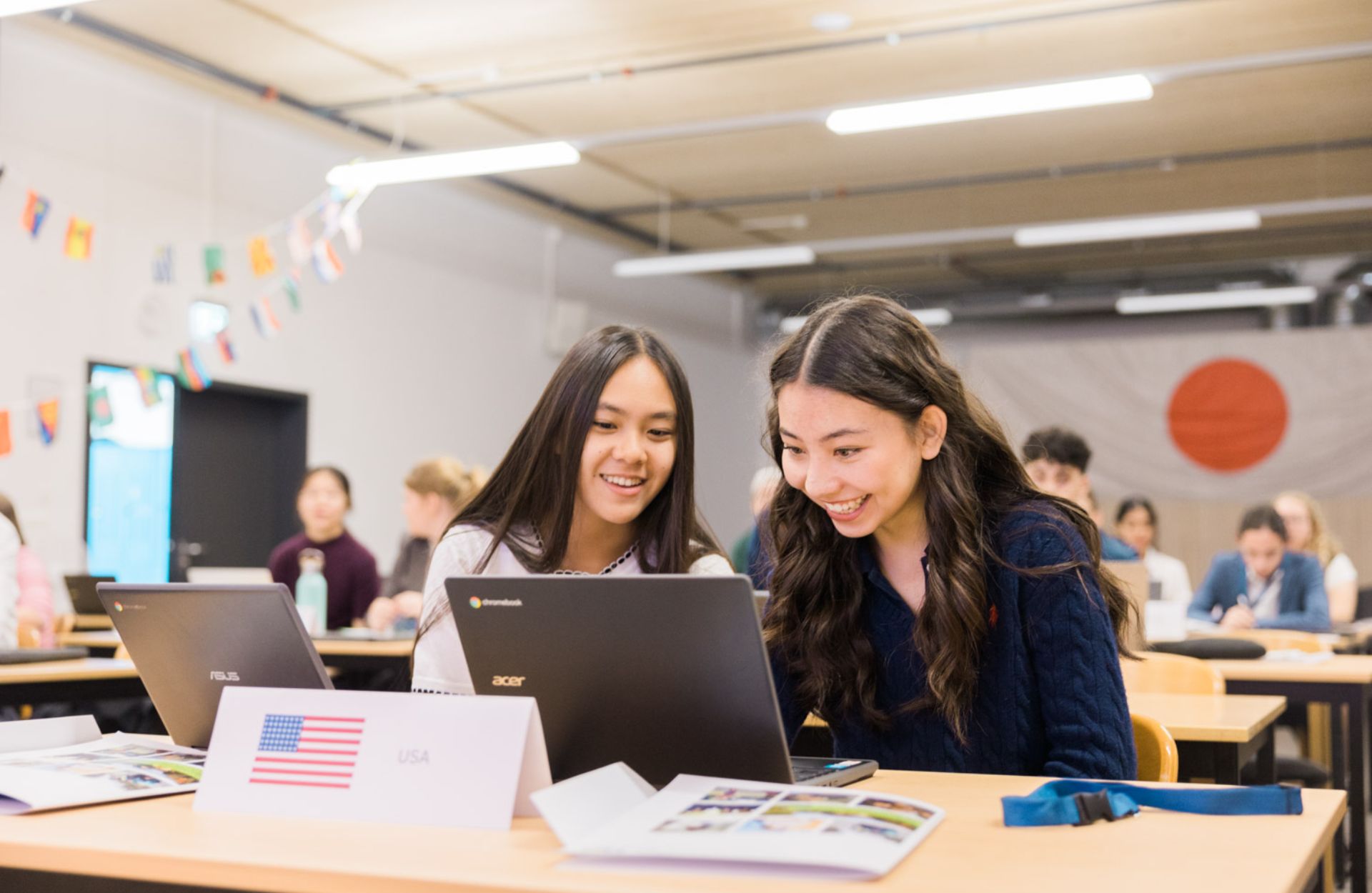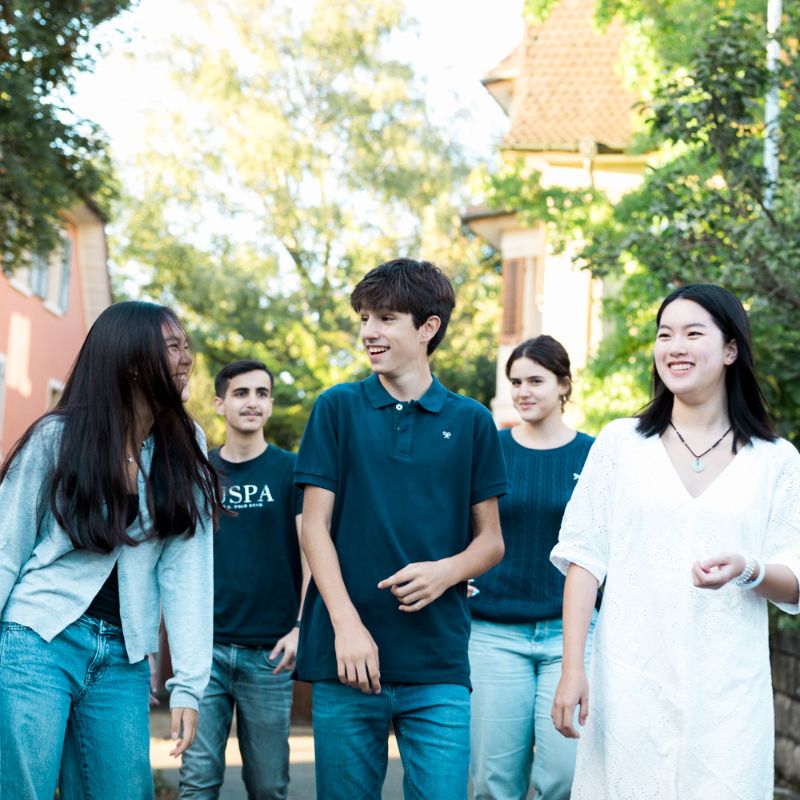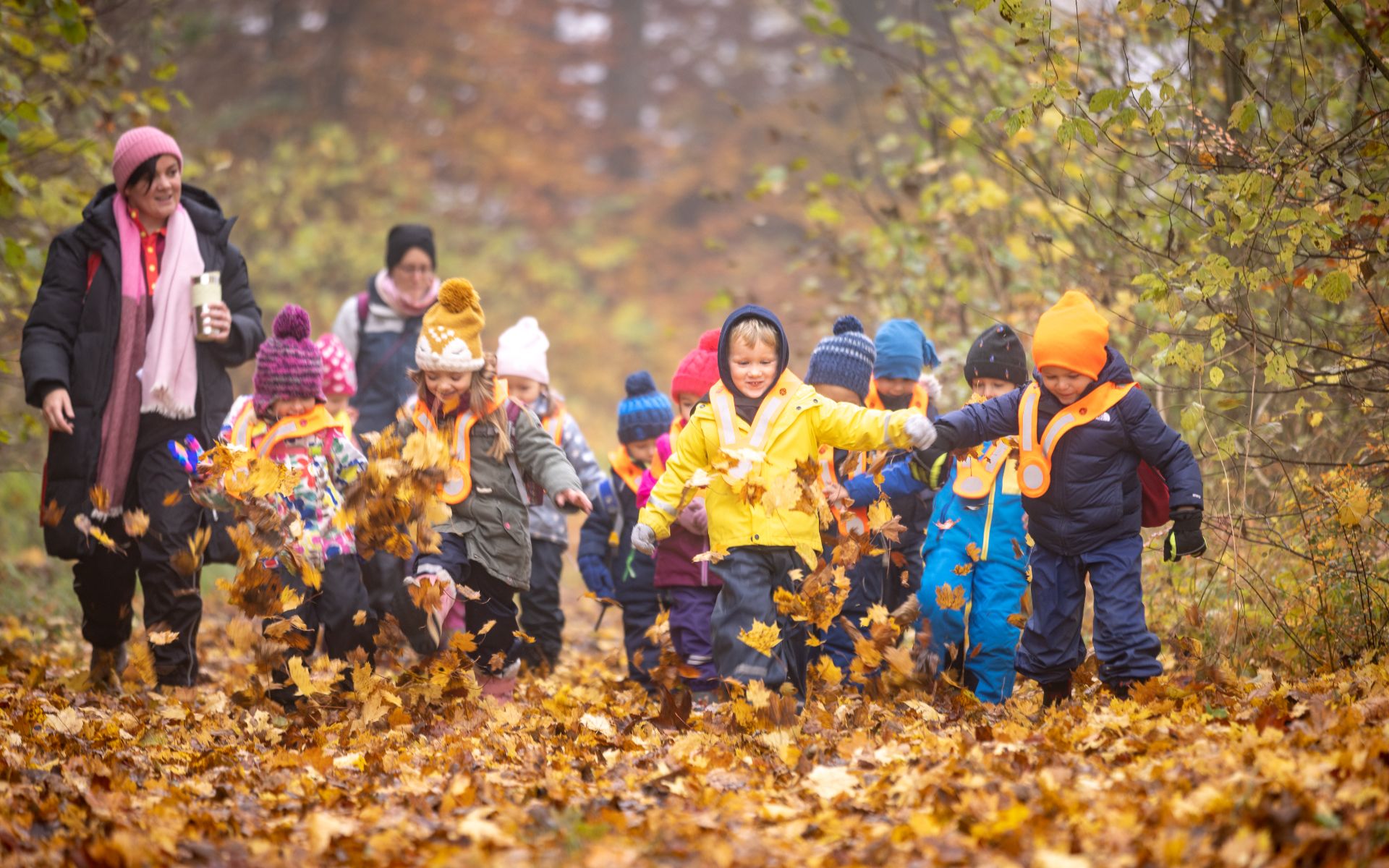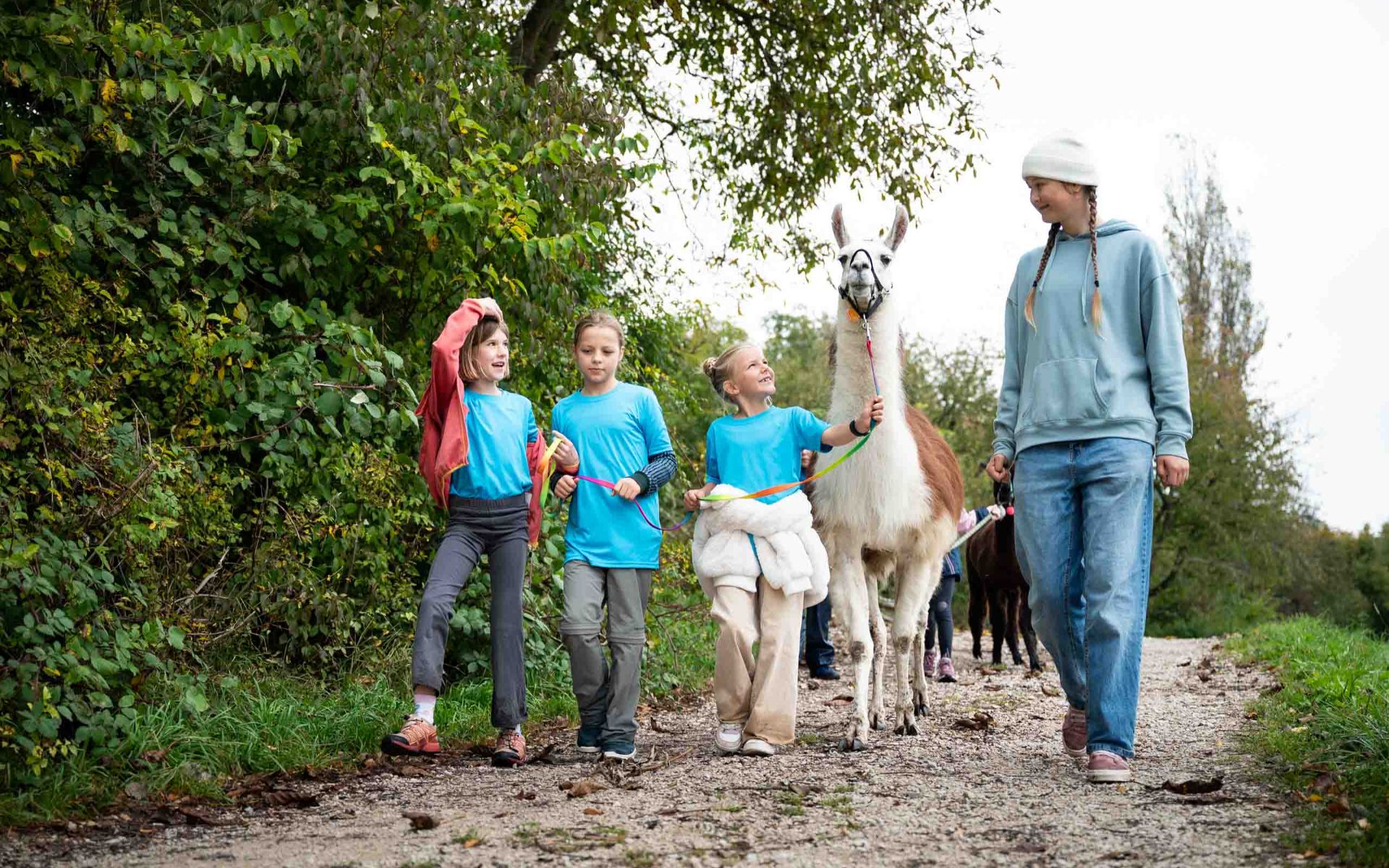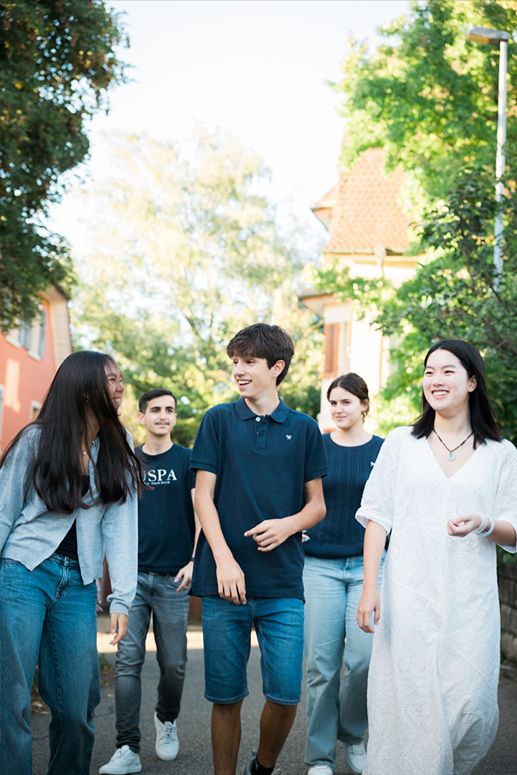General admissions questions
The International School of Schaffhausen is an IB World School offering educational programming spanning all stages of your child’s development.
- Childcare: ages 3 months to 3 years– Our childcare programme serves infants and toddlers from the age of three months until three years of age. We provide a nurturing environment where a love of discovery is fostered and the development of milestones is supported.
- Early Learning Centre: ages 3 to 6 years– The Early Childhood Education Programme cultivates a love of learning where children are encouraged to develop at their own pace, in a safe and dynamic environment.
- Primary school: ages 6 to 11 years – Our Primary Programme follows the IB PYP curriculum and encourages an inquiry-based approach to learning. Our programme develops curiosity, creativity and critical thinking, while supporting the social and personal development of our students.
- Secondary school: ages 11 to 16 years – The Secondary Programme at ISSH builds on the PYP curriculum and serves as a pathway to the International Baccalaureate Diploma and High School Diploma Programmes. At our school, education goes beyond academics; we nurture the whole child, empowering their intellectual curiosity, emotional resilience, social confidence, and ethical awareness to help them thrive in every aspect of life.
- ISSH High School Diploma: ages 16 to 19 years– Our ISSH High School Diploma, accredited by the Middle States Association (MSA), offers a strong academic foundation through a curriculum inspired by the International Baccalaureate (IB) programme. Our High School Programme prepares students for successful entry into Universities in the United States and Canada, as well as Universities of Applied Sciences in Switzerland and across Europe.
- International Baccalaureate (IB) Diploma: ages 16 to 19 years– The ISSH IB Diploma Programme provides an education that opens doors to top universities in Switzerland, Europe, and around the world. Through a broad range of academic subjects and a strong focus on personal, social, and ethical growth, the IBDP empowers students to think critically, act responsibly, and thrive in a global context.
We accept children into our Childcare Programme from as young as three months old, and welcome new students at any stage of their academic journey.
Students are able to join ISSH at any point during the school year, whether relocating to Schaffhausen mid-term or arriving from countries with different academic calendars. While it is preferable for students to begin at the start of a term, we are happy to accommodate individual circumstances and make the transition as smooth as possible.
ISSH welcomes non-native English speakers, and a significant number of our students speak a different mother tongue. We provide English as an Additional Language (EAL) support for students at various stages of their language acquisition journey.
English is the language of instruction at ISSH, and a certain level of proficiency is essential for academic success. Students entering Grades 9 or 10 are expected to have at least a B1–B2 level of English. For those joining Grades 11 or 12, particularly in the IB Diploma Programme, a C1 level of English is required to meet the demands of the curriculum and to fully engage in classroom learning.
ISSH is an inclusive school, and we are proud to support students with a range of additional learning needs. We offer individualised learning plans and tailored support for students with mild to moderate educational needs.
Our team is experienced in working with students with mild neurodevelopmental needs and learning differences. In some cases, supplementary fees may apply to cover the cost of additional educational services necessary to provide appropriate support.
ISSH is an English-speaking school where English is the primary language of instruction across all grade levels. While many of our students are non-native English speakers, they develop strong language skills over time, often reaching near-native proficiency by the time they graduate.
In the Secondary School, we offer Language A (Mother Tongue) and Language B (Language Acquisition) courses in both English and German. French, as Switzerland’s host language, is introduced from Grades 5 to 8 and becomes an optional subject from Grade 9 onward.
In the Primary School, students take German as a Second Language, helping them integrate linguistically within the local context while building a foundation for future language learning.
Yes, ISSH does offer trial days—in fact, we actively encourage them. Trial days provide a valuable opportunity for students, families, and the school to get to know one another and to determine whether ISSH is the right environment for the student to thrive.
Yes! We welcome campus visits from all of our applicant families at any time. Campus visits can be arranged by contacting us at [email protected]
ISSH offers day camps during the summer and other holiday camps for children aged 5 o 14 years old. More information can be found about Holiday camps here.
ISSH welcomes day students from the Primary years to the completion of Secondary school. For students aged 14 and above, ISSH offers a boarding school programme. Day and boarding students attend our academic courses according to our School timetable. Boarding students stay in our neighbourhood-style boarding houses where they are supervised by a team of caring boarding staff outside of school hours. Boarding students also benefit from additional enrichment experiences such as hikes, travel excursions, museum trips, and more!
ISSH offers academic excellence at exceptional value. You’ll find comprehensive information about Tuition here.
We accept tuition payments by bank transfer. Detailed information regarding payment procedures is included in our school invoices.
Most of the time, yes! At ISSH we are committed to providing our families with flexible and transparent payment policies. We can accept payment in full, or a quarterly tuition payment model. The details of our payment policies can be found in Financial regulations document.
Please note that this is not the case for boarding students residing in non-EU, non-EFTA countries. The migrations office requires that families pay the tuition in full prior to applying for a student visa.
- Most costs associated with attending ISSH are included in our tuition fees.
- In our Childcare Programme, meals, snacks, and hygiene items are all provided.
- For students in the Primary and Secondary Schools, tuition fees cover instruction and learning materials; however, hot lunch, which is optional, is charged separately.
- Boarding fees cover the majority of costs, including tuition, accommodation, all meals, supervision and pastoral care, as well as occasional excursions.
ISSH does not require a school uniform. Students are free to dress as they wish, provided their clothing is appropriate for a school setting.
Younger children in the Childcare, Early Learning Centre and Primary School should be dressed suitably for the weather, as outdoor play is part of our daily routine. Good quality outdoor clothing is essential to ensure children can participate comfortably in all activities throughout the year.
Digital technology can be a helpful learning and teaching tool, and we believe that fluency with technology is an essential academic skill. However, balance is important, and there are times and places where students are not permitted to use digital technology. Our classrooms are equipped with many technological tools to support learning, and when possible, students benefit from hands-on experiences working with technology. In the PYP programme, we take a low-tech approach to instruction, with our primary focus on the development of core educational skills. Computer use is introduced in the grades three and four, but does not become a habitual component of the classroom environment until the fifth grade.
At ISSH, we understand that mobile phones are an important part of life in today’s connected world. However, during school hours, we believe in creating a focused and distraction-free learning environment. For this reason, mobile phones must be kept in lockers for Secondary students, and are not to be used during class or throughout the school day. Devices may be accessed again once classes are dismissed and students are off campus.
Early Learning
Ages 0-6 years
In our Childcare and Early Learning Centre, ISSH offers tailored educational programmes for the youngest of our community members. The Childcare Centre is available for infants from three months old to toddlers up to three years of age. Our Early Learning Centre is open to children between the ages of three and six years old.
The Childcare programme provides a warm and nurturing environment tailored to support each child’s early milestones. Activities such as sensory play, music, cooking, nature walks and roleplay, encourage the emotional, social, and cognitive development of young children.
In pre-kindergarten and kindergarten groups in the Early Learning Centre, our programme helps preschool children develop the skills and independence necessary for elementary school. We encourage creativity, curiosity and a love of learning, in a supportive environment that allows children to develop at their own individual pace. The ELC follows the IB PYP curriculum that focuses on inquiry and play-based learning.
For babies and toddlers enrolled in Childcare, most daily items are included in the costs of Childcare fees. We provide lunch, snacks, diapers and other hygiene items. For bottle-fed babies, we ask that you provide formula or milk from home.
For pre-schoolers enrolled in the Early Learning Centre, lunch, snacks, and hygiene items are not included in the school fees. Parents may opt to select our hot lunch service, which is invoiced as an additional cost.
For our youngest children, as much as possible, we try to follow each child’s own rhythm and we let them nap when they are tired.
Children in the ELC Programme, from the age of three onwards, are not usually expected to take a nap, but we do provide scheduled quiet time once a day when they can rest, or take a small nap if needed.
Absolutely!
We ask that the normal food safety and storage protocols be followed.
Flexibility is important to families!
We offer many different options for Childcare at ISSH. Care is available from 7:45 until 18:00 on Mondays through Fridays. Childcare can be arranged for the full day, half days, or core time (7:45 until 15:45). For babies and children up to the age of 4 years old, the minimum booking is two half-days (only 1 day of booking is not possible). For older children of Kindergarten age, there is a mandatory kindergarten attendance in line with the cantonal requirements.
In some cases, parents who live in the Canton of Schaffhausen and who are both employed or registered as unemployed, can apply for a subsidy provided by the Canton of Schaffhausen. In general, Childcare subsidies are available until the start of Kindergarten. Our administrative team is happy to provide more information and the required application forms.
Yes! (Well, almost yes.)
ISSH Childcare and Early Learning Centre are open 49 weeks per year. We understand that reliable childcare is essential for families. They remains open all year, with the exception of the week between Christmas and New Year, two weeks in late July and early August and public holidays.
In both our Childcare and our Early Years programme, English is the dominant language, while German is also spoken. Our programme focuses on developing key skills such as language acquisition, and children develop proficiency in both English and German. Swiss German can be added based on the needs of the child. As our team is very international, our staff speak a range of languages, which can be helpful when a child starts with no or limited language skills.
Children can be dropped off from 7:45 in the morning and must be picked up before 18:00. We lock all gates at 18:00 so the latest arrival should be at 17:45 in order to have enough time for the feedback and to get the child ready to leave.
We use an app called The Famly App where parents can easily communicate with the caregivers, make changes to their childcare schedule, monitor attendance, and receive invoices and daily updates about their child.
Children do fall ill from time to time. In the event that your child comes down with a contagious illness, we require that the child stay at home until they are well, in cases we can demand a certificate from a pediatrician. We require that you wait 24 hours after a fever or gastrointestinal symptoms have subsided before returning to childcare. If your child develops a fever or illness while they are in the Childcare or Early Learning Centre, we will notify you and request that you pick up your child as soon as possible. We will keep your child comfortable until they can be picked up.
Primary School
Ages 6-11 years
The integration period is important for a successful start at a new school. For students starting school in August, we host a welcome event the day before school starts. This allows students to connect with fellow new students, and get acquainted with teaching staff and campus. We also host an all-school welcome event shortly after the start of school. For students who face challenges during the adaptation process, our school counsellor can provide individual support and encouragement.
The school day begins at 8:15 and continues until 15:30. In the mornings, students take a short break outdoors, before returning to class. Lunch is served in shifts from 11:30 until 13:00, with the younger children eating first, followed by outside play time. Wednesdays are early release days at 12:00 for students in Primary School and until the 10th grade in Secondary,
We offer a hot lunch at an additional cost. Children may also bring lunch from home.
Our flexible programme allows families to select the hot lunch option on one day, several days, or every day of the school week. The meals are provided by a professional caterer, Restaurant Buechbrunnen, Schaffhausen. The health and nutritional needs of our students is a priority. Our approach emphasises the importance of healthy, seasonal produce to ensure that our students receive nutritious, balanced meals that support their well-being and academic performance. The menu includes a main dish of meat, chicken, or fish accompanied by vegetables and a starch, and a salad or fruit. Dishes containing pork are never served at ISSH.
The cost for hot lunch ranges from 11 to 12 CHF, depending on the student’s grade level.
For students who prefer to bring their own lunch from home, they have access to microwaves to heat up their meals, if they wish.
Yes! We do offer after-school care through our Discovery Afternoon programme for students in the Primary School. After school care is available from 15:30 to 18:00 on Mondays and Thursdays, and from 12:30 to 18:00 on Tuesdays, Wednesdays and Fridays. Check Discovery afternoons for more information.
Secondary School & IB Diploma
Ages 11-19 years
At ISSH, all students follow a well-rounded curriculum with prescribed subjects across all grade levels. In grades 6 to 8, students take a broad range of core subjects including Languages (Literature and a second language), Humanities, Sciences, Mathematics, and Personal Development.
Starting in grades 9 and 10, students continue with core academic subjects but begin to have limited choice in selecting one or more subjects based on their interests and strengths.
By grades 11 and 12, students have greater flexibility to choose the subjects they wish to pursue in alignment with their academic goals, either through the ISSH High School Programme or the IB Diploma Programme.
Please contact our Admissions team for detailed information about current subject offerings.
ISSH offers two certifications: The ISSH High School Diploma and the International Baccalaureate Diploma Programme. The ISSH High School Diploma is certified by MSA, while the IBDP is regulated by the International Baccalaureate Organisation.
The short answer is, it depends. Admission to Swiss universities is influenced by several factors, including the student’s final qualification, their IB scores, and their language proficiency in the language of instruction (German) and their proficiency in the language of instruction.
In general, entrance to Swiss universities requires the IB Diploma with a score of at least 32, and fluency in the university programme’s language of instruction. However, the specific requirements vary between institutions and programmes of study.
For students graduating with an ISSH High School Diploma, there are options to complete post-secondary education in Switzerland. Several Universities of Applied Sciences in Switzerland accept applicants with a High School Diploma.
Our University and Career Counselling Programme supports students in identifying their preferred universities and understanding the specific requirements they’ll need to meet for admission.
In grades 9 and 10, students may take courses in Visual Arts, French, and Business Studies as electives.
Promotion refers to moving up from one grade to another. Our curriculum is rigorous, and our promotion requirements are firm to ensure success at the next grade level. Our students are evaluated on a seven-point scale. To advance, students must achieve an average score of 4 or higher in each core subject. Throughout the school year, we monitor each student’s performance and evaluate whether they are meeting or exceeding all the required skills in each subject.
The specific promotion requirements vary by grade, and our admissions team would be happy to provide you with more specific information.
Swiss boarding school
International student questions
The tuition fees for boarding school students are outlined on our Tuition page and a detailed description of all costs associated with attending the International School of Schaffhausen can be found in our Fees and Financial Regulations document.
Most of the costs associated with attending ISSH as a boarding school student are covered by our school fees, including tuition, learning materials, care and supervision, all meals, excursions for boarding school students, etc. Please note that health insurance and liability insurance are required, and these charges will be invoiced separately.
The International School of Schaffhausen's boarding houses offer a neighbourhood-style boarding experience in a family-like environment. Our boarding houses are located in quiet residential neighbourhoods, a short bus ride away from campus. Each dorm was originally a large, family home that has been converted to meet the needs of boarding students. The dorms are co-ed, with one boy’s floor and one girl’s floor. The houses each accommodate up to ten students, with most students residing in double rooms. In addition to student rooms, there is a large kitchen area, a common room, and a staff room where our house carers stay.
Single rooms are occasionally available; however, they are allocated based on individual needs and the overall house dynamic. Our boarding team takes special care to create a welcoming and comfortable ambiance. Rooms and roommates are selected with the intention to optimise the boarding experience for all.
Visa requirements for studying in Switzerland vary depending on a student’s nationality. Students who are residents of a Schengen country do not require a student visa to study in Switzerland. However, third-country nationals must apply for a student visa before arriving in Switzerland.
Further information is available
Generally speaking, a visa application requires several documents including the visa application form, passport photos, a confirmation of enrolment letter, a confirmation that the tuition fees have been paid, proof of financial support, a confirmation letter stating that you will depart Switzerland after your studies, your CV, and a motivation letter.
While ISSH can offer guidance during the visa application process, the Swiss regulations require that families complete the application independently. We will, however, provide all necessary documentation from the school required for the visa application, including the confirmation of enrolment and proof of payment.
Yes, all meals are included in the boarding fees. Students enjoy breakfast in the boarding house, a hot lunch is served at school, and dinner is taken at the boarding house. A shared evening meal is an important part of the ISSH boarding experience. Each student takes turns to assist our boarding staff in planning and cooking the evening meals, and the meals are enjoyed together. Our boarding students graduate with solid culinary skills!
Yes, absolutely!
Our boarding houses are located off-campus, so students naturally venture into the local area as part of daily life. Switzerland is an exceptionally safe country, and Schaffhausen is a peaceful, small city—ideal for fostering responsible habits in a secure environment.
We guide students in developing confidence and self-reliance through what we call structured freedom. They’re encouraged to explore Schaffhausen, interact with the community, and learn to manage their time responsibly.
Students must return to the boarding house before dinner and adhere to a set curfew. A sign-out system ensures we always know where our students are, providing a balance between trust and accountability.
For some families, this approach may feel unfamiliar. However, in Switzerland, a high degree of personal responsibility is part of everyday life—even young children often walk to school or take public transport on their own. The country's safety and cultural norms make this kind of personal growth not only possible but expected.
In Switzerland, health insurance is mandatory for all residents and is governed by the Swiss Federal Law on Compulsory Health Care. Everyone must be covered by a policy approved by the Swiss Federal Department of Home Affairs. If a student doesn’t already have qualifying Swiss coverage, ISSH will arrange enrolment in our group insurance plan. This plan is comprehensive, offering excellent care with no deductible and no copay.
It’s natural for students to fall ill from time to time, and our boarding team is dedicated to making sure they feel safe, cared for, and supported throughout. For minor ailments like colds or mild viral infections, our house carers provide comfort and attentive care, perhaps with a warm cup of tea, a nourishing meal, and some extra TLC. They’ll monitor symptoms and decide if a visit to the doctor is necessary. If so, we’ll arrange the appointment, manage any prescribed medications, and ensure that follow-up care is taken seriously. Throughout the process, we keep parents informed and reassured, especially important when you're far from your child.
In cases of more serious illness or injury, our team responds quickly and appropriately. If hospital care is needed, we’ll make every effort to reach parents right away, keeping them involved in any important medical decisions. Should we be unable to contact a parent, the Head of Boarding will temporarily assume medical responsibility and follow the advice of healthcare professionals to ensure the student receives timely and appropriate treatment.
ISSH has a comprehensive supervision plan in place to ensure the physical and emotional wellbeing of all our boarding students. Qualified caregivers stay overnight in the boarding house and are responsible for both daily supervision and pastoral care.
While students enjoy a level of structured freedom and are permitted to leave the boarding house, they must follow our sign-in/sign-out procedures, keep staff informed of their whereabouts, and respect curfew. We trust our students to act responsibly, but if someone struggles to meet expectations, the Head of Boarding will step in to provide additional guidance, boundaries, and support as needed to keep them safe.
At times, students may need extra emotional support, whether due to homesickness, academic pressure, or social challenges. Our caring staff are attentive to these moments and offer encouragement and a listening ear through informal, day-to-day interactions. The Head of Boarding maintains a clear overview of each student’s emotional wellbeing and steps in when additional support is required. In more serious cases, we work closely with our Secondary School Counsellor and, when necessary, bring in external mental health professionals to provide expert care.
ISSH offers several clubs and activities for all pupils, including boarding students. The activities vary from year to year, and may include experiences such as team and individual sports, artistic and design projects, and opportunities to serve the ISSH community.
In addition, our school encourages boarding students to get involved in the local community by joining clubs or teams. Schaffhausen offers a wide breadth of activities and experiences: football, handball, martial arts, dance, canoeing and kayaking, musical groups, art classes, just to name a few. Our boarding team is more than happy to assist our students in finding a club or team to join and help with registration and sign-ups.
Weekends at ISSH offer our boarders a chance to unwind and recharge. Students have the chance to sleep in on weekends, and they can help themselves to breakfast (or brunch in some cases!) in their own time. On Saturday mornings, students are responsible for cleaning and tidying their rooms; a small routine that helps foster personal responsibility. With a tidy room, students are free to plan their day as they like: visiting local friends, playing sports, exploring the area, or focusing on academic tasks.
The boarding team regularly organises excursions that offer meaningful opportunities to connect with Swiss culture and the local environment. Whether it’s attending a festival, visiting a museum, or heading out on a scenic hike, these outings help students experience the richness of life in Switzerland, through both culture and nature.
We also invite students to collaborate with staff in planning weekend activities that match their interests. This might include a trip to see a new film at the cinema, a session at the indoor climbing centre, or a sunny afternoon at the local Badi (lakeside swimming area). Our aim is to create weekends that are both enriching and restful
The overall approach of the ISSH Boarding Programme is to provide structure freedom, so that young people can develop a strong sense of responsibility and the skills necessary for success after high school. One of the skills that we support students in acquiring is the management of screen time.
We do not take a one-size-fits-all approach to limits on screen time. In general students are permitted to keep their devices with them, provided that they can use the devices responsibility. When the boarding team determines that a student is using technology excessively, or in a way that has a negative impact on their studies, social life, or mental health, we will create boundaries around device time for that student.
The house wi-fi is turned off overnight and at the weekend, from 12:30 to 15:00. During this time phones are left in the common room which encourages screen-free time: reading, writing, creating, studying or socialising.
Usually, no. For some younger students, or students who need extra motivation to study, we do create a mandatory study period. However we have the expectation that all students will learn to take responsibility for their own studies.
We recognise that each individual has their own rhythm, and some students are natural early birds while others are night owls. We encourage students to study when they feel most productive and most alert.
Young people can easily open a bank account in Switzerland and will receive a debit card. Parents may then transfer money directly to their child’s bank account. There are also many online services or online banks that make international transfers simple and cost effective.
We discourage students from keeping large amounts of cash in their possession.
For newly arriving students, we can arrange to pick them up at the airport and accompany them to the boarding house. As students become more familiar with and more comfortable with Schaffhausen, they will be able to manage going to and from the airport independently. If boarding students require assistance to and from the airport beyond their initial arrival, we can arrange transport at additional cost.
Public transportation in Switzerland is very safe, efficient, and easily accessible. There are direct trains from Schaffhausen to Zurich Airport, making arrivals and departures easy.
In general, yes we can, and we are happy to do so.
We can accommodate most food allergies. In the case of students who have life-threatening, critical food allergies requiring strict avoidance, we would need to have an in-depth conversation with the parents to ensure we can provide the necessary accommodations.
With regard to faith-based dietary requirements, we can make some accommodations. While we can not provide a strictly observant kosher kitchen nor fully compliant halal menu, we can make some accommodations. As part of ISSH policy, we never serve pork at our school.
We encourage all borders to take part in local community clubs and sports teams, and are happy to accomodate students' activity schedules. When a student has a commitment that conflicts with dinner time, we will always leave a plate of food ready for the student when they return to the boarding house. We can easily accommodate a schedule that includes a couple of evenings a week away from the boarding house, however we do expect students to join us for evening meals most days. The evening meal is an important part of the ISSH boarding experience, and we would expect boarding students to join us for dinner at least three to four times a week.
Yes! They are welcome to. However, we require all visitors to follow boarding house rules. Visitors are welcome in our common spaces, the garden and kitchen. Same-gender friends are permitted to visit bedrooms provided the roommate agrees. Boys are not permitted to visit the girls floor, and vice versa.

.jpg)
